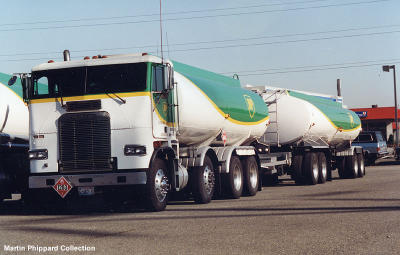Held to ransom by the selfish and the greedy.

It doesn't take a lot to get people panicking in general. When the panic involves the price of petrol, before you know it people are filling their cars full and leaving the stations empty. That's exactly what happened in some areas yesterday, and appears to be continuing on a slightly lower level today:
Customers began panic-buying petrol in some parts of the country yesterday, with long queues and anger on the forecourts as fears grew of fuel blockades.
Drivers were caught in hour-long queues in London, Yorkshire and Essex, while in the West Country and the Midlands some fuel stations ran out of petrol temporarily.
The stockpiling came after protesters predicted a fierce battle with the government as they prepared for three days of blockades outside refineries.
The protesters from the Fuel Lobby, including farmers and lorry drivers, have given the government until 6am tomorrow to meet them or face protests. They are demanding that the chancellor, Gordon Brown, cut tax on petrol by 10%. But Mr Brown will use a speech to the TUC's annual conference today to emphasise the global nature of the problem.
There were signs yesterday that not everyone is supporting the demonstrations. The Road Hauliers Association, which represents 10,000 hauliers, is not taking part in the protest.
"The police are concerned about terrorism at the moment; they have said they will throw an iron ring around refineries," said Steve Williams, from the association. "They are overstretched already with the terrorist threat and we don't want to be involved in something that will stretch them further."
The Fuel Lobby protesters say they will start three days of demonstrations if ministers do not meet them on Tuesday.
It wants the public to "attend" oil refineries on Wednesday to protest.
Lobby spokesman Andrew Spence said: "We are not calling for a blockade, but if oil companies decide they cannot send out lorries while there is a public presence at their site, then that is a matter for them."
Sir Jonathan Porritt, chairman of the Sustainable Development Commission, said the last thing the government should do was cut fuel duty.
Fuel prices needed to be kept high to drive changes in consumer behaviour and drive investment in new energy efficiency technology.
The average cost of petrol in the UK is now around 96p a litre. The price has risen dramatically this year due to the rising cost of oil, and has now been pushed higher due to Hurricane Katrina in the United States, which knocked out a series of refineries.
The price in the UK for petrol is higher than most countries on the continent for a few simple reasons. While countries such as France have lower tax duty on petrol, they pay more in taxes than we do in Britain in other ways. Secondly, this is not the government's fault. Gordon Brown has frozen the rise of fuel duty in line with inflation now for two years due to the high price of oil. As a result, pump prices have actually risen slower than in other countries. Britain is also running out of oil in its North Sea plants, making us coming to rely more on imports, especially from the Opec countries.
This however goes straight over the heads of the constantly angry majority in the country. The farmers, haulage industry and business leaders are all majority Tory voters and supporters. In addition to this, most farmers do not pay duty on their fuel, as they get the special "red-diesel". The haulage industry, which wants to introduce huge 60-ton trucks to British roads, permanently demands lower and lower fuel prices. This is not out of wanting to charge their customers lower prices; it's because they want to pocket the difference and make even huger profits, at the expense of the environment.
In fact, they have chosen the entirely wrong target. They should be focusing on the oil companies themselves, who are making huge profits in the wake of record oil prices. In July both Shell and BP announced record half-year profits, totaling 11bn. Imagine how those profits could be used to help lower the burden on the consumer. Of course, they will instead continue to please their shareholders by driving for ever huger surpluses.
Most of all though, it shows how out of touch the majority are, and how the general public and business is not admitting to a new global reality. Global warming is here, and it isn't going to go away. As we continue to use up the remaining oil we have at an ever faster rate, we are ever closer bringing us towards a crash. We need to reduce our use and reliance on oil, the car and the airplane immediately. This means changing our lives. Unless we face up to this, the crash will be more devastating and arrive sooner. At the moment we are being held to ransom by the selfish, the greedy and the dishonest. If the government gives in, then their entire environmental policy will be shown to be even more of a sham than it already is.
Post a Comment